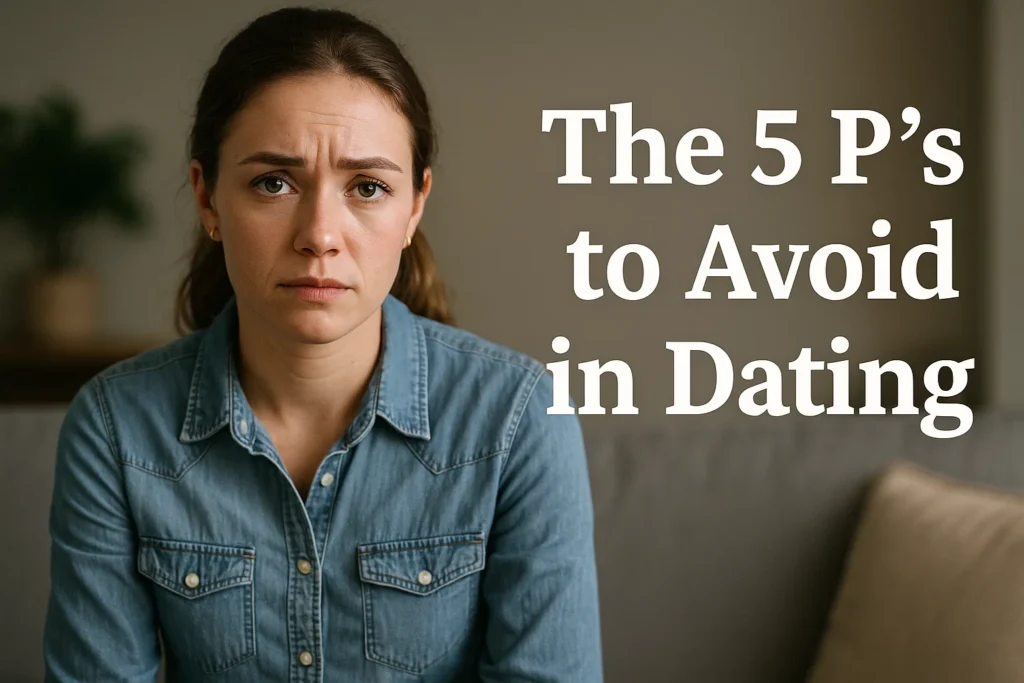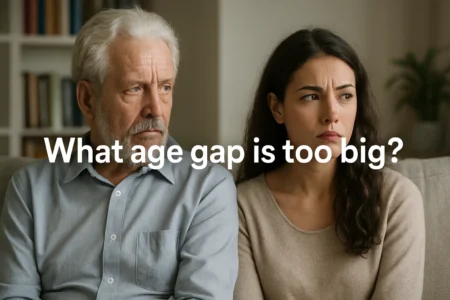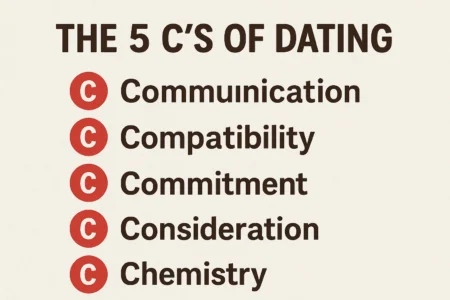Dating. Just the word can make you want to either curl up with a good book or throw your phone across the room. It’s a jungle out there. We spend so much time building our careers, nurturing our friendships, and trying to be our best selves, only to find that the world of modern romance feels like a baffling, high-stakes game we never got the rules for. We’ve all read the articles that tell us what to do: be confident, be yourself, have a great opening line.
But what about what not to do?
Sometimes, the key to success isn’t about adding more to your plate; it’s about knowing what to take off. We’re often our own worst enemies, sabotaging potential connections without even realizing it. We bring old baggage, unrealistic expectations, and deep-seated fears to a first-date coffee, and then we wonder why it never led to a second date. This realization hit me hard after a particularly confusing breakup, and it led me to ask, “What are the 5 P’s to avoid in dating?”
Identifying these pitfalls was a game-changer for me. They’re the subtle traps, the subconscious habits, and the mental roadblocks that keep us stuck in a cycle of “almost” relationships and frustrating mismatches. So, let’s clear the clutter. Let’s talk about the five things you need to ditch to finally find the genuine, healthy connection you deserve.
More in Dating Specific Types Category
What are the 5 stages of dating
What is a financial red flag in a relationship
Key Takeaways
- Avoid Perfectionism: Searching for a flawless “unicorn” partner (or trying to be one) blinds you to real, compatible human beings.
- Stop Projecting: Don’t let your past traumas or your ex’s bad behavior paint your new partner with the same brush. See the person in front of you.
- Reject Possessiveness: Control is not a sign of love. Healthy relationships are built on trust, autonomy, and mutual respect, not jealousy.
- Don’t Be Passive: People-pleasing and having no boundaries (like being a “dating chameleon”) leads to resentment, not connection. Know who you are and what you want.
- Drop the Pessimism: If you go into every date expecting it to fail, you’ll find a way to make it fail. Your mindset is a self-fulfilling prophecy.
Are You Waiting for a Unicorn That Doesn’t Exist?
Let’s start with the big one: Perfectionism. Oh, this one is sneaky. In our careers, striving for perfection can get us a promotion. In dating, it gets us a one-way ticket to being alone. This trap works in two ways: we either hunt for the “perfect” partner, or we paralyze ourselves trying to be the “perfect” partner.
I know this one intimately. For years, I had a mental checklist. I’m talking, specific. He had to be over six feet tall, have a certain type of job, read the “right” books, and have a perfectly witty sense of humor that aligned 100% with mine. I once dated a guy—we’ll call him “Checklist Chad”—who was flawless on paper. Great job, handsome, owned a home, and even volunteered at an animal shelter. My friends were swooning.
The problem? We had zero chemistry. None. Our conversations were like pulling teeth. But I tried. I forced it for weeks because he checked every single box. I was trying to fall in love with a resume, not a person. Consequently, I was miserable, and I was wasting his time and mine.
Why Does a “Perfect” Checklist Actually Hurt You?
That checklist you’re clinging to? It’s not a tool. It’s a shield. It feels productive, like you’re “curating” your choices, but what you’re really doing is protecting yourself from the vulnerability of a real connection. A real person is going to be messy. They’ll have weird quirks. They might snort when they laugh or have a different opinion about your favorite movie.
Perfectionism doesn’t just apply to them; it applies to us. We think, “I can’t start dating until I lose ten pounds,” or “I need to be more successful before I’m ‘worthy’ of a great partner.” We polish and perfect ourselves into these shiny, untouchable versions of who we are, and then we wonder why we can’t make a genuine, human-to-human connection.
It’s a trap.
Is “Good Enough” the New “Perfect”?
Let me be clear: this isn’t about lowering your standards. It’s about changing them. Ditch the superficial checklist and focus on your core values. How do they treat the waiter? Are they kind? Are they curious about your life? Do you feel like you can breathe out and be your weird, authentic self around them?
The goal isn’t to find a “perfect” person. The goal is to find a person who is perfect for you. That means finding someone whose flaws you can live with and who can live with yours. It’s about compatibility, not perfection.
Is Your Past Haunting Your Present Dates?
Okay, let’s get real. If you’ve dated for more than five minutes, you probably have some baggage. A difficult breakup, a partner who cheated, someone who was emotionally unavailable—we all have ghosts. The problem arises when we let those ghosts sit down at the table with us on a new date. This is Projecting.
Projecting is when you take your past experiences and “project” them onto your new partner, assuming they will behave in the same way. You stop seeing the person in front of you and start seeing the person who hurt you.
I had a massive wake-up call with this. My “Texting Trauma,” as I call it, came from an ex who used silence as a weapon. If he was mad, he’d ignore my texts for hours, sometimes a whole day. It was emotional torture. Fast-forward a year, and I was dating “Mark,” a genuinely great guy. One afternoon, I sent him a text, and he didn’t reply for three hours.
I spiraled.
By the time he texted me back (“So sorry! My boss called me into a last-minute meeting, just got out!”), I had already tried, convicted, and sentenced him in my mind. I was cold, accusatory, and distant. I accused him of “punishing” me. He was, understandably, completely baffled. I wasn’t reacting to him—a busy professional who had a valid reason for being offline. I was reacting to my ex.
How Do You Know If You’re Projecting?
It’s subtle. Do you ever find yourself thinking, “All men are…” or “All women just want…”? That’s a projection. Are you overreacting to a minor incident? Maybe they were a few minutes late, and you immediately assume they’re selfish and don’t respect your time (just like your last partner). Are you constantly comparing? “Well, my ex used to bring me flowers…”
These are all signs that you’re not in the present moment. You’re in a time machine, dragging old fears into a new situation. This is incredibly unfair to the new person. They’re essentially being blamed for a crime they didn’t commit.
How Can You Stop Projecting and Start Seeing Them?
The key is a four-letter word: Pause. When you feel that hot, familiar surge of anger, fear, or anxiety, just stop. Take a breath. Ask yourself this one crucial question: “Is this feeling based on what is actually happening right now, or is it based on what I’m afraid might happen?”
Give them the benefit of the doubt, at least at first. Let their own actions show you who they are. Don’t let your past make your decisions for you.
Does Your “Caring” Look a Lot Like Controlling?
This “P” is a red flag waving in a hurricane. Possessiveness. This is the wolf in sheep’s clothing. In the beginning, it can be disguised as intense passion or deep caring. “I just worry about you,” or “I just want to be with you all the time.” It can feel flattering.
It is not.
Possessiveness isn’t love; it’s a toxic cocktail of insecurity, anxiety, and a deep-seated need for control. It’s the belief that a person can be owned. It starts small. Maybe they get a little pouty when you make plans with your friends. “You’d rather see them than me?” Then, it escalates. They need to know where you are 24/7. They question who you’re texting. They “don’t like” your friend who they see as a threat.
Before you know it, your world has become very, very small, with them at the absolute center. This is not a foundation for love. It’s a foundation for isolation.
What Are the Early Red Flags of Possessiveness?
You have to spot these signs early, before you’re in too deep. Keep an eye out for someone who:
- Monitors your activity: This includes constantly checking your phone, demanding your passwords, or tracking your social media comments.
- Isolates you from your support system: They’ll subtly (or not-so-subtly) criticize your friends and family, making it difficult for you to see them.
- Exhibits extreme jealousy: They see everyone—your coworker, the barista, your best friend—as a threat to your relationship.
- Uses guilt as a tool: “If you really loved me, you wouldn’t…” This is a classic manipulation tactic designed to control your behavior.
- Has a “love-bombing” cycle: They’ll overwhelm you with affection, gifts, and compliments, and then flip to anger or “cold” treatment the second you do something they don’t like.
Why Is Trust More Important Than “Passion”?
We’re often fed a line in movies that jealousy is a sign of fiery passion. It’s not. It’s a sign of profound insecurity. In a healthy, secure relationship, you are two whole individuals who choose to be together. You have separate lives, friends, and interests, as well as a life you share.
There is no relationship without trust. Period. Your partner should be your biggest cheerleader, not your prison warden. As experts on relationships from institutions like Texas A&M University point out, healthy relationships are built on respect and autonomy, not on control and suspicion. If you feel like you’re constantly walking on eggshells or having to “report in,” that’s not love. It’s a hostage situation.
Have You Forgotten What You Actually Want?
This is the “P” that I struggled with the most: Passivity, and its very close cousin, People-Pleasing. This is the “I don’t know, what do you want to do?” syndrome. It’s the act of erasing yourself in the hopes of being more likable.
When you’re a people-pleaser, you become a chameleon. You change your opinions, your hobbies, and even your personality to match whoever you’re with. You’re so terrified of conflict or of being “too much” that you become… nothing. You’re agreeable. You’re easy-going. And you’re completely inauthentic.
I once went through a very embarrassing “Indie Music” phase. I was dating a guy who was a self-proclaimed music snob, and I wanted so badly for him to like me. So, I pretended to love his obscure, screechy indie bands. I sat through so many miserable, loud concerts, nodding my head and pretending I was having a profound experience.
One night, he turned to me and asked, “What do you want to listen to?” I completely blanked. I genuinely had no idea what music I liked anymore. It was a tiny, silly moment, but it was a massive wake-up call. I had been so busy being his perfect girl that I had completely lost track of myself.
Are You a Dating “Chameleon”?
Are you nodding along to everything your date says, even when you’re screaming “no” on the inside? Do you never pick the restaurant, the movie, or the activity? Do you say “yes” to a second or third date even when you felt zero connection, just because you don’t want to hurt their feelings?
If this sounds familiar, you’re a dating chameleon.
Here’s the tragic part: this strategy always backfires. You can’t build a real connection on a fake foundation. The other person is falling for a character you’re playing, not for you. And it’s exhausting. Eventually, the resentment builds up. You end up angry at them for not seeing your needs, but how could they? You never told them.
Why Are Boundaries Actually Attractive?
Here’s the secret: People-pleasing isn’t attractive. Self-respect is. Having boundaries, an opinion, and a sense of self is what makes you interesting. It shows that you value yourself.
Think about it. Do you really want to date a mirror? Or do you want to date someone who can introduce you to new things, challenge your perspectives, and stand on their own two feet?
Saying “No” is a complete sentence. “I’m not a big fan of horror movies, how about we try that new comedy instead?” is not a deal-breaker. It’s a data point. It shows who you are. The right person won’t be scared off by your boundaries; they’ll respect them.
Are You Expecting the Date to Fail Before It Even Starts?
The final “P” is Pessimism. This is the heavy, gray cloud that follows you from app-swipe to first-date drink. This is the “dating apocalypse” mindset. It’s the “all the good ones are taken” and “dating is just awful” mentality.
When you’re a pessimistic dater, you’re not dating to connect; you’re dating to confirm your bias. You’re on the lookout for the inevitable flaw. The second they do something “wrong”—use the wrong emoji, wear a shirt you don’t like, tell a “meh” joke—you mentally check out. “See?” you tell yourself. “I knew it. Another dud.”
This negativity is palpable. It radiates off you. Even if you’re smiling and being polite, the other person can feel that you’re not really there, that you’re just waiting for an excuse to leave.
“All the Good Ones Are Taken”: How Does This Mindset Sabotage You?
It becomes a self-fulfilling prophecy. If you believe all your dates will be terrible, you will find a way to make them terrible. You’ll be closed-off, critical, and unapproachable. You’ll interpret a simple, human moment of nervousness as a “fatal flaw.”
This pessimism is often a defense mechanism, just like perfectionism. If you expect the worst, you can’t be disappointed, right?
Wrong.
You just guarantee your own disappointment. You rob yourself of any possibility of joy, surprise, or genuine connection. You’re so busy protecting your heart that you’ve sealed it shut. This burnout is real, especially after a string of bad dates. But letting it turn into full-blown pessimism is like slashing your own tires and then complaining that you can’t go anywhere.
Can You Really Change Your Dating Mindset?
Yes. It’s not easy, but it’s simple. It starts with shifting your goal. The goal of a first date is not to find your soulmate. The pressure! The goal is simply to have a conversation with another human being. That’s it.
Instead of going in with the mindset of “Is this my future spouse?” try “I’m curious to learn this person’s story.” This lowers the stakes immediately. It takes you out of your head (judgment mode) and into the present (curiosity mode).
Here are a few other ways to combat dating pessimism:
- Practice “date gratitude.” Find one good thing about every date. Even if the connection wasn’t there, maybe you learned about a new book, or the restaurant had great fries, or you got to tell a funny story.
- Take a real break. If you are truly burnt out, delete the apps. Take a month off. Date yourself. Fill your own cup. Don’t date from a place of desperation or exhaustion.
- Stop “hate-swiping.” We all do it. Swiping on the toilet, bored in a meeting, just to feel like we’re “doing” something. Be intentional. Set aside 20 minutes to swipe, and then put it away.
Moving Past the 5 P’s: What’s Next?
So there they are: Perfectionism, Projecting, Possessiveness, Passivity, and Pessimism. These are the five shadows that follow us into the dating world, whispering doubts and fears in our ears. They’re the reason we feel so stuck.
But here’s the good news. Now you can see them. Now you can name them. And the second you can name something, you take away its power.
Avoiding these 5 P’s isn’t about becoming some perfect, zen dater who never makes a mistake. It’s about self-awareness. It’s about catching yourself when you’re projecting your past onto your present. It’s about finding the courage to state your preferences instead of melting into a puddle of people-pleasing. It’s about choosing to be curious instead of critical.
Dating is, at its core, an act of optimism. It’s the belief that connection is possible and that you are worthy of it. By clearing away these 5 P’s, you’re not just improving your ‘chances.’ You’re making space for the right person to finally see the real, wonderful, and imperfectly human you.
FAQ – What are the 5 P’s to avoid in dating
Why is perfectionism a trap in dating?
Perfectionism is a trap because it leads us to seek an unachievable ideal, causing us to overlook genuine, compatible connections and trying to be perfect ourselves, which prevents authentic relationships.
How does projecting affect new relationships?
Projecting causes us to see past experiences or past partners in our new partners, which prevents us from truly seeing who they are and can lead to misunderstandings and unfair judgments.
Why is possessiveness harmful in a relationship?
Possessiveness is harmful because it reflects insecurity and control, which can lead to isolation, diminish trust, and prevent the healthy autonomy necessary for a strong relationship.
What mindset should I adopt to improve my dating life?
You should adopt an optimistic mindset focused on curiosity rather than judgment, setting healthy boundaries, and being authentic, which helps you attract genuine, compatible connections.





